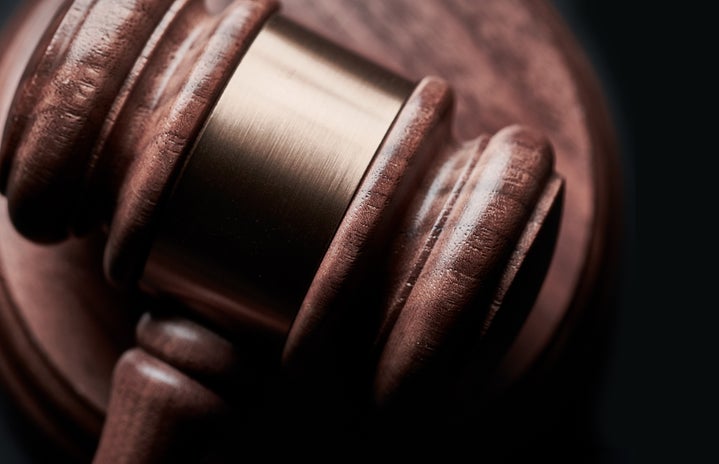Trigger warning: this article discusses sexual assault.
To celebrate International Women’s Day, Suzie Miller’s Prima Facie was aired at the BFI followed by a discussion panel with female lawyers. This poignant story exposes the injustices within our justice system, focusing particularly on the treatment of sexual assault survivors during the trial process. Comer’s solo performance as a defence barrister is breathtaking as she shows us the process of defending a sexual assault case, both from the victim’s and a defence lawyer’s perspective. The conversation following this unique screening delved further into the injustices within the system which left me with a greater understanding of this devastating reality and the inspiration to write this piece.
The creation of movements such as #MeToo and various other platforms created for women to share their experiences has led to more open conversations about sexual assault and the treatment of women. This play exemplifies how art can also be used to address these topics and provoke meaningful discussions. The story focuses on Comer’s character, Tessa, who is a successful defence lawyer. She takes on a sexual assault case defending a potential rapist, working to uncover holes within the victim’s story. She wins the case, insisting it is not a lawyer’s job to play God but “rather to deliver the best narrative that [they] possibly can”. It is not Tessa’s duty to decide if her client is guilty or innocent, but rather to convince the jury of the latter. This idea is turned on its head as the play progresses as Tessa herself is subjected to non-consensual sex during a seemingly successful date with a co-worker. As Comer, alone onstage, embodies her character’s experience of the assault, the audience are forced to complete the image in their own minds. This horrific and shocking, yet delicately choreographed sequence presents an absolute turning point of the play as the defence lawyer becomes the victim herself. As Tessa decides to take her case to the police, we witness the process in which the “patriarchal power of the law, burden of proof and morals diverge”.
Having been a human rights and criminal defence lawyer for years, Miller has personally experienced the contradicting and impossible attitudes of the justice system towards women. She states that “the law reframes a woman’s experience of a horrific crime against [her]”, an observation central to Prima Facie’s narrative. At the start of the play, Tessa feels empowered by her law career which provides her with a sense of strength and superiority. However, as the roles reverse and we watch her experience the brutal reality of fighting for justice as a woman, Miller is able to put the law system under scrutiny. The playwright observes that since the law was created by men for men, in a time when women were viewed more as property than equal and functioning members of society, female needs are regularly neglected by the legal system. She notes that in order for the law to function successfully and as intended, faith in it is essential. Miller’s play asks if the legal system really deserves our trust when justice for sexual assault victims comes at such a price.
As well as questioning the morality of the law, Tessa’s profession as a barrister enables Miller to examine the conflicting emotions that female lawyers experience. We see Tessa approaching her cases as if they were a narrative, a fiction which she must deliver as convincingly as possible, finding cracks in victims’ trauma-induced testimonies and exploiting them to benefit her client. We follow Tessa as she discovers the justice system is, as Miller calls it, an “imperfect human construct”. Miller shows us the double-edged sword of working in law as a woman. Whilst it allows women to “access power” in a predominantly male-dominated field, Dr Karen O’Connell observes that it also, in turn, has the capacity to “oppress and … disempower them”. Prima Facie’s narrative successfully portrays this tension, and the conflict, confusion and frustration that female lawyers may feel in this environment. Miller’s powerful play raises many important questions about the legal system from a perspective not regularly offered – that of a female deeply embedded within the system itself. Miller’s “authentic intersection between art and social change” successfully incorporates discussions about female autonomy and oppression within this supposedly fair and equal system. Crucially, this play is written by and about white female experiences in an already white-dominated profession and national institution, and we cannot negate the specificity of this experience. It is undeniable that additional prejudices ingrained in the criminal justice system only amplify the horrors depicted in this play. Nevertheless, Prima Facie, with its powerful closing line “something has to change”, is both a plea and a battle cry that mobilises women of all walks of life.
If you or someone you know has been sexually assaulted, you can call the Rape Crisis England & Wales 24/7 Rape and Sexual Abuse Support Line on 0808 500 2222 or visit the following link to start a live chat: https://247sexualabusesupport.org.uk/?utm_source=rapecrisis.org.uk&utm_medium=want+to+talk+page&utm_campaign=support+line+website&utm_content=hero+block+bullet+points&_gl=1w52ip3_gaMTE3OTA4MTY3MS4xNzA4ODA0NDQ2_ga_T6N32822TV*MTcwODgwNDQ0Ni4xLjAuMTcwODgwNDQ0Ni42MC4wLjA


